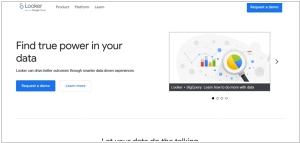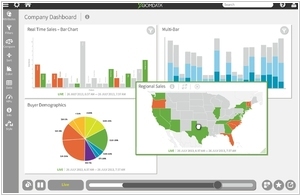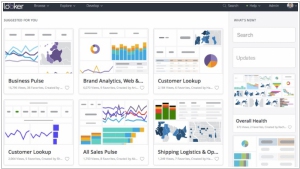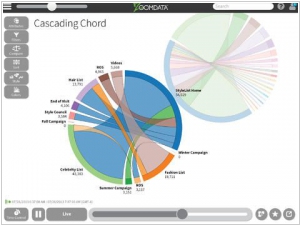Looker vs Zoomdata
May 28, 2023 | Author: Michael Stromann
Looker and Zoomdata are both data visualization and business intelligence platforms that help organizations derive insights from their data. However, they have some key differences in their features and functionalities.
Looker is known for its robust data modeling capabilities and intuitive interface. It offers a unified and centralized platform for data exploration, visualization, and reporting. Looker allows users to create and share interactive dashboards and reports, conduct ad-hoc analyses, and collaborate on data-driven insights. It also provides advanced features like data modeling, embedded analytics, and data governance. Looker is suitable for organizations that require powerful data modeling capabilities and want to empower their business users to explore and analyze data independently.
Zoomdata, on the other hand, is a real-time data visualization platform that specializes in visualizing and analyzing large and streaming datasets. It excels in handling real-time data sources and offers features like data connectors, dynamic charting, and interactive visualizations. Zoomdata supports a variety of data sources, including traditional databases, big data platforms, and cloud-based data sources. It is ideal for organizations that require real-time analytics and want to visualize and monitor data streams in a dynamic and interactive manner.
See also: Top 10 Business Intelligence software
Looker is known for its robust data modeling capabilities and intuitive interface. It offers a unified and centralized platform for data exploration, visualization, and reporting. Looker allows users to create and share interactive dashboards and reports, conduct ad-hoc analyses, and collaborate on data-driven insights. It also provides advanced features like data modeling, embedded analytics, and data governance. Looker is suitable for organizations that require powerful data modeling capabilities and want to empower their business users to explore and analyze data independently.
Zoomdata, on the other hand, is a real-time data visualization platform that specializes in visualizing and analyzing large and streaming datasets. It excels in handling real-time data sources and offers features like data connectors, dynamic charting, and interactive visualizations. Zoomdata supports a variety of data sources, including traditional databases, big data platforms, and cloud-based data sources. It is ideal for organizations that require real-time analytics and want to visualize and monitor data streams in a dynamic and interactive manner.
See also: Top 10 Business Intelligence software
Looker vs Zoomdata in our news:
2022. Google unifies its BI services under the Looker brand

Google Cloud has made an exciting announcement, revealing its decision to consolidate all of its business intelligence products under the unified brand of Looker. This consolidation brings together Looker, Data Studio, and core Google technologies such as artificial intelligence (AI) and machine learning (ML). Google emphasizes that this integration goes beyond traditional dashboards, which are the specialty of Google Data Studio, enabling businesses to incorporate data into various workflows and applications for informed decision-making. As a part of this transition, Google Data Studio will now be known as Looker Studio. Looker itself was a startup that Google acquired in 2020 for an impressive $2.6 billion. With this unified approach, Google officially enters the competitive landscape, challenging established players like Tableau, Microsoft Power BI, and QlikView.
2014. Zoomdata wants to disrupt Business Intelligence market

The highly competitive Business Intelligence (BI) market has seen a disruptor emerge with Zoomdata securing $17 million in Series B funding to drive its mission forward. In contrast to BI competitors like Tableau and Qlik, which originated from the realm of SQL and data warehouses, Zoomdata takes a more contemporary approach to modern data analytics. Built specifically to handle today's platforms such as Hadoop, Spark, and NoSQL, Zoomdata sets itself apart by being designed from the ground up with these technologies in mind. One standout feature of Zoomdata is its ability to stream data in a manner akin to video playback, enabling users to navigate back and forth in time, much like scrubbing a video. This unique capability proves invaluable when working with data, as it allows users to observe the transformation of graphs and visualizations over time, providing crucial insights into evolving trends and patterns. With its innovative approach and powerful features, Zoomdata aims to reshape the BI landscape and deliver cutting-edge analytics solutions.




